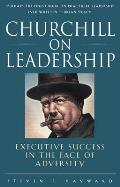 by Steven Hayward
by Steven Hayward
Why should business leaders study Churchill, a political leader. Steve Hayward notes that Churchill’s leadership was primarily during wartime. So he may have more lessons for business leaders, who are always in competition, than for politicians, who more often seek consensus. Compare, for example,Churchill to Herbert Asquith, who was a tremendous peacetime leader, but whose skills were whollyunsuited for wartime. Churchill’s relentless energy and wide-ranging intellect also made him suitedfor basically one position – Prime Minister. That should appeal to aspiring CEOs, who feel stifled in their current jobs.
Hayward posits four basic keys to understanding Churchill: his candor and plain speaking, his decisiveness, his historical imagination, and his ability to balance the big picture with attentionto detail. While some of these are typical of leaders, historical imagination stands out. Churchill’sability to learn not merely from his own mistakes (more on that later), but from others’, often distantin time, helped him imagine options that eluded others.
Churchill’s speaking style comes into play – his love of short words, his persuasion by analogy, therhythms of his speech. At one point, Hayward lays out a passage from one speech as blank verse, andit reads better that way. CEOs are more likely to communicate by memo than by address, and we also see some examples of clear writing. Churchill’s famed energy – always driving the machine forward – is another key to his success.
Perhaps a less-known, and less-appreciated aspect of Churchill’s success was his love of innovation.He switched the fleet from coal to oil, extending its range considerably. He practically inventedthe notion of naval flight, and pushed, well out his department, the WWI development of the tank. Sadlyfor the Allies, when he was sacked in 1915, he was no longer around to push the idea, and there wasalmost no one left who had given a thought to its proper use. It may well have cost the Allies a yearof extra fighting.
In fact, though, it was his drive for innovation that led to an opportunity to exercise another of hismaxims – learning from mistakes. Churchill saw that Asquith’s passive leadership was allowing the generals to get away with conventional thinking, and that was leading to the stalemate on the WesternFront. Hayward goes into some detail on the ill-fated Dardanelles expedition, which turned on Churchill’swatch into Gallipoli, an operational disaster. Without strong central leadership, the military plannerscouldn’t figure out what to do with the operation, and eventually abandoned it on the point ofsuccess. It also proved to be an object lesson in how a poor system can swallow a subordinate with ideas.
Perhaps the greatest asset a wartime leader can have, and perhaps one that eludes most businessmen,is a sense of moral vision. Hayward points out that while Hitler used many of the same politicaltactics as Churchill, history has judged them very differently. Churchill was tempermentally optimistic,and carried a courage born of that optimism. It served to inspire an entire country.
Hayward unfortunately does a poor job of explaining why the CEO could benefit from the same. Too often, business leaders lack the moral vision that’s necessary to inspire. It’s not merely the running of acompany in an ethical manner, or good corporate governance that’s at stake. It’s not even the belief thatone’s particular business is going to change the world, appealing though that idea may be. (Certainlymany dot-coms got their employees to work 80-hour weeks for more than just stock options – there was a realsense of being present at the revolution.)
No, moral vision in this context is the sense that by engaging in business, one is engaging in a fundamentallymoral enterprise. If successful, it will lead to the direct employment of many people, and the indirectemployment of many more. It will raise the standard of living of even more, both customers and employees.It will almost certainly lead to innovation, in the imagination or making of its products, or by some suppliereager to capture the company’s business. Michael Novak, in Business as a Calling and The Spiritof Democratic Capitalism argues that while the excessive love of money can corrupt, engaging in businessis a fundamentally virtuous pursuit. And belief in the rightness of what one is doing, not merely how one isdoing it, is the key to a moral vision.